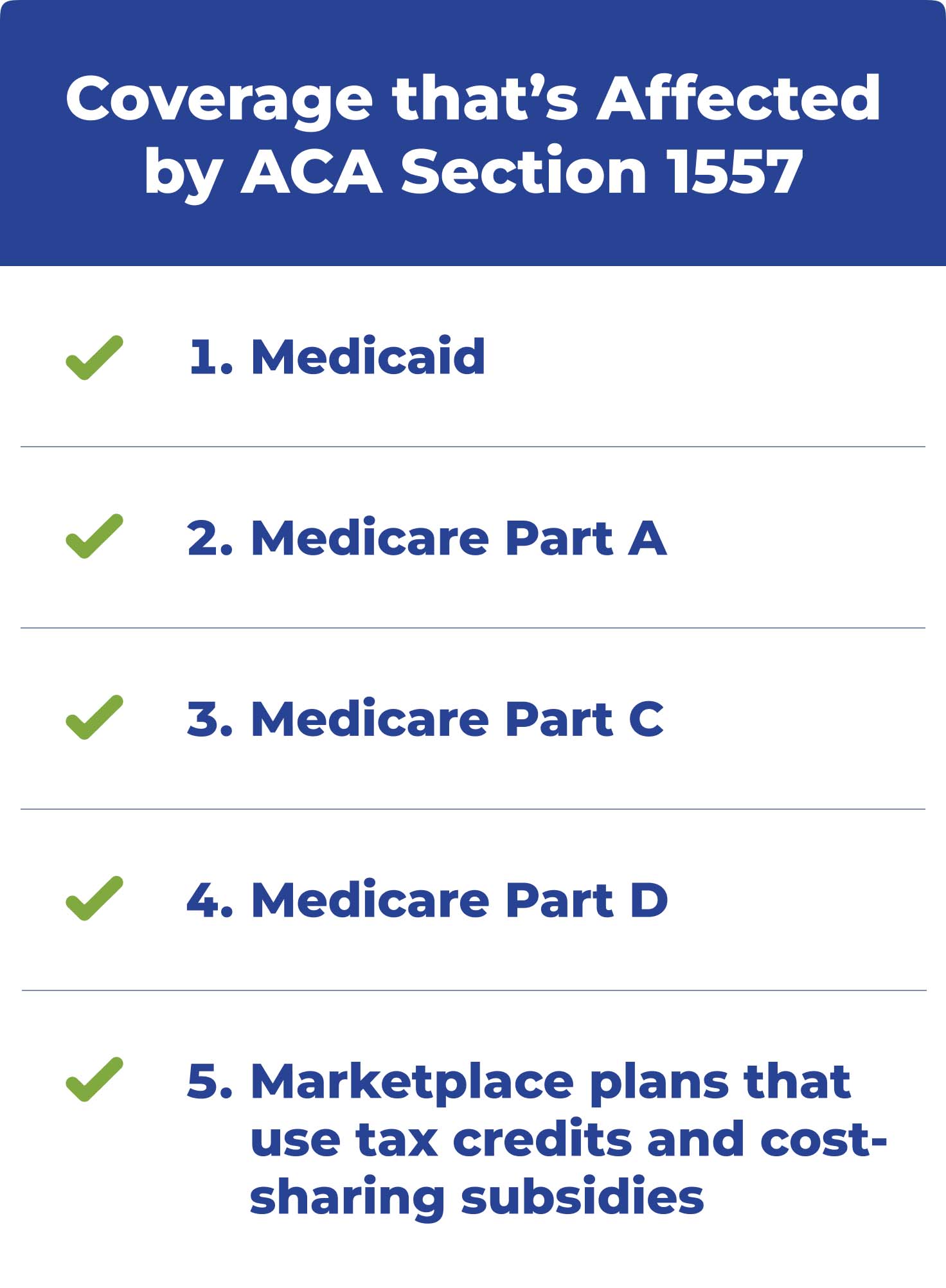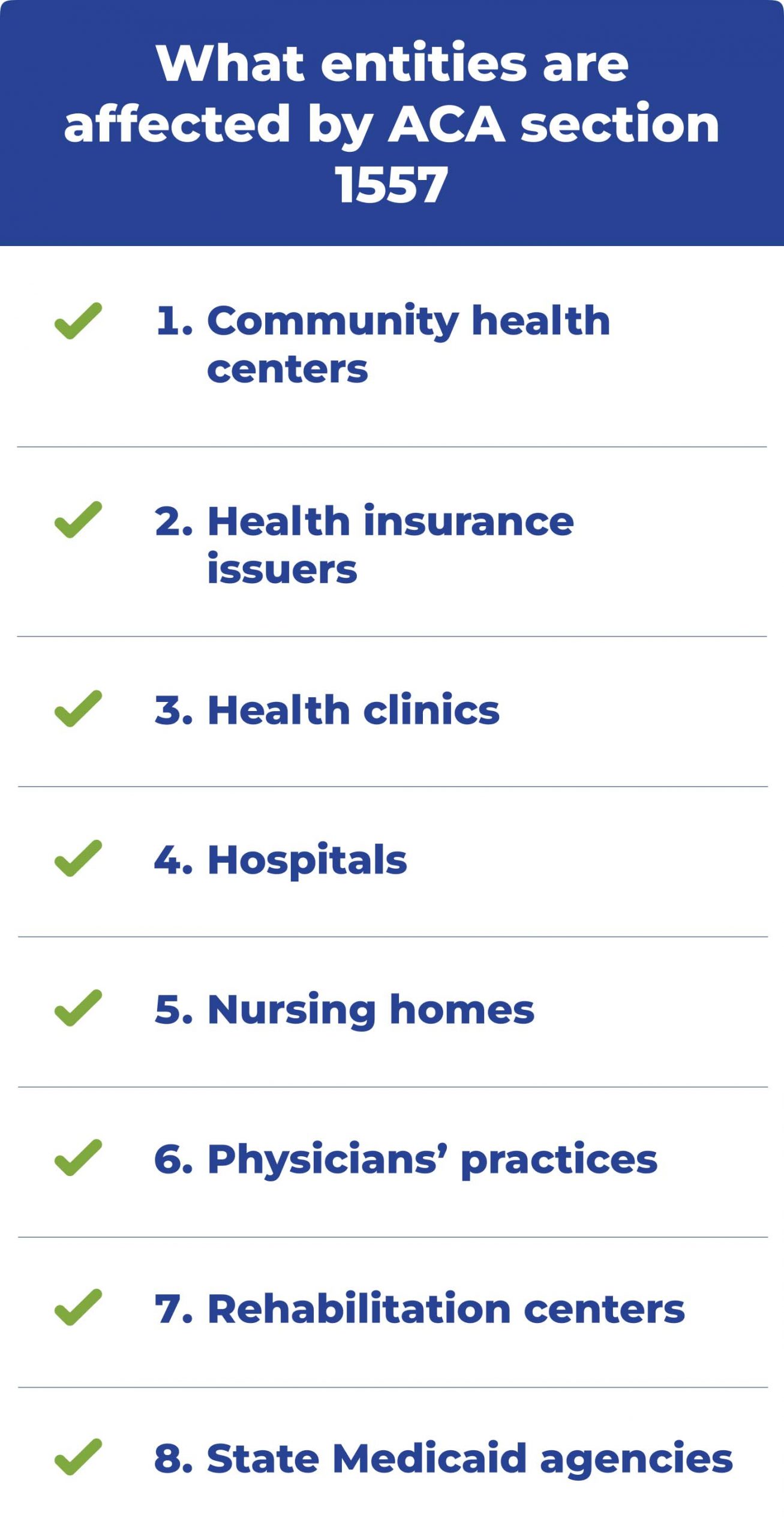
Racial disparity is a concern when it comes to affordable and quality healthcare. The Affordable Care Act (ACA) aimed to close this gap and ensure nondiscrimination protections for everyone regardless of race, age, disability, color, natural origin, or sex.
The final rule posted by the U.S. Department of Health and Human Services (HHS) Office for Civil Rights (OCR) finalized these protections in 2020.
Below we’ll discuss the implications of ACA Section 1557, the Final Rule of 2020, and the changes. Then, we’ll answer a few frequently asked questions and explain how to get help with Medicare plan options regardless of your situation.
ACA section 1557
Section 1557 doesn’t allow health programs and activities that receive federal funds to discriminate based on the abovementioned disparities.
It’s also the first federal civil rights law to prohibit discrimination of sex for health-related services and procedures. The final rule eliminated some of the broad characteristics of the law and made it more specific.
Key changes in the final rule
The previous rule from 2016 had a broader scope and included provisions about sex stereotypes and gender identity. The differences between the 2016 and the 2020 final rule are as follows.
- Adoption of blanket abortion and religious freedom exemptions for healthcare providers and physicians
- Removed prohibitions against discrimination of sexual orientation and gender identity
- Removed preventions from health insurers from offering benefits in a way that could discriminate against specific groups such as LGBTQ individuals
- Removed the provision that eliminated the general prohibition of discrimination for gender identity, sex stereotyping, and specific health insurance protections for transgender people
- Removed the provisions that affirmed the right of individuals to challenge alleged violations in the courts to obtain monetary damages, as well as the requirements for grievance procedures and nondiscrimination notices
- Lowered protections provided access to translation and interpretation services for people with limited English proficiency
- Narrowed the scope and reach of the law by only covering specific coverage and activities that receive federal funding
Coverage that’s affected by ACA section 1557
The ACA Section 1557 applies to only health insurance issuers and coverages that receive federal funding. Federal funding includes grants, property, and payments towards premiums of affected Insurance coverage options. Insurances that are affected include:
- Medicaid
- Medicare Part A
- Medicare Part C
- Medicare Part D
- Marketplace plans that use tax credits and cost-sharing subsidies
Medicare Part B is not affected by the nondiscrimination requirements of the final rule presented by HHS in 2020. Likewise, most group health plans don’t receive federal financial assistance. Therefore, they’re not affected by ACA Section 1557.
Affected entities
The ACA Section 1557 doesn’t only apply to insurance but also to other facilities and organizations that are recipients of federal financial assistance, such as:
- Community health centers
- Health insurance issuers
- Health clinics
- Hospitals
- Nursing homes
- Physicians’ practices
- Rehabilitation centers
- State Medicaid agencies
New requirements for affected entities
ACA Section 1557 created several new regulations implemented on affected entities. These organizations, facilities, and companies must meet the additional requirements below.
- Provide effective communication and accessibility for people with disabilities
- Assure meaningful access for people with Limited English Proficiency (LEP)
- Secure protection of individuals against sex discrimination
- Entities that have more than 15 individuals must appoint a compliance coordinator and produce a grievance procedure
- Supply protection for coverage of health insurance
- Inform people that the covered entity doesn’t discriminate based on race, color, national origin, sex, age, or disability. This notification occurs by posting notices of nondiscrimination
- Inform people that the covered entity supplies trained interpreters to ensure meaningful access by posting taglines in, at a minimum, the top 15 non-English languages spoken in the State
These requirements were changed when the ACA adopted the 2020 final rule. As of 2020, Entities with more than 15 individuals no longer must appoint a compliance coordinator or produce a grievance procedure.
They’re no longer required to provide notice of nondiscrimination policies in significant communications such as employee handbooks and publications for outreach, physical locations, and website homepages.
The final rule removed this requirement because these regulations are already in place from the following laws.
- Title vi of the civil rights act of 1964
- Title vii of the civil rights act of 1964
- Title ix of the education amendments of 1972
- Age discrimination act of 1975
- Section 504 of the Rehabilitation Act of 1973
- ACA Section 1557 also carries over protections for disabled individuals from the rehabilitation act of 1973
LEP individual protections
Affected entities must provide individuals with limited English proficiencies with clear notices, translation, and language assistance services and take appropriate steps to supply language access and translation services to people with limited English proficiency. These protections are required to prevent discrimination based on national origin.
Protections for sex, race, color, age, disability, and national origin
Civil rights protections have been a hot button for years, and specific laws and regulations have tried to combat discrimination.
While Title vi provides some longstanding protection, ACA Section 1557 adds additional protections for racial discrimination against race, color, and national origin in the healthcare industry.
ACA Section 1557 is unique from other civil rights laws as it is the first to add discrimination protections based on gender. These protections prohibit affected healthcare organizations from the following.
- Declining, canceling, restricting, denying a health insurance plan, or renewing a health insurance policy
- Declining or restricting coverage of a health insurance claim
- Inflicting extra cost sharing or other constraints, exclusions, or limitations on coverage
- Using discriminative marketing procedures or insurance benefit designs
Before the ACA Section 1557 took effect, health plans could provide certain services for men but deny them to women.
Another form of discrimination that could have taken place would be placing specific medications to treat particular illnesses on the highest cost tier or limiting the age on practices confirmed to be appropriate for all ages.
Abortions and religious exemptions
The 2020 final rule also amended the original ACA regulations that required all entities to provide coverage for abortions.
The previous rule didn’t give any rights to religious exemptions. The final rule reincorporation the religious exemptions for specific procedures.
This change made it no longer sex discrimination if it involved paying for an abortion or would be inconsistent with the organization’s religious beliefs.
FAQs
What health plans does Section 1557 apply to?
ACA Section 1557 affects all health plans that receive federal funding. This funding can be in premium payments, grants, property, tax credits, and cost-sharing subsidies.
Affected insurances include Medicare Part A, Medicare Advantage plans, Medicare Part D prescription drug plans, Medicaid plans, and Marketplace plans.
What are the ACA Section 1557 rules for disability?
It assures that healthcare providers are not biased towards individuals in the community, have access to healthcare insurance, and make it affordable for the residents.
Affected entities must be impartial about individuals with diverse ethnic backgrounds, races, gender, religion, physical appearances, and individuals with disabilities.
ACA Section 1557 also ensures all individuals have equal policies and procedures, physical access, and communication.
What Medicare programs are covered by Section 1557?
Not all Medicare programs are affected by Section 1557, such as Medicare Part B and Medicare Supplement insurance. They aren’t affected because they don’t access or receive federal funds.
ACA Section 1557 affects the following parts of Medicare:
- Part A Hospital Insurance
- Part C Medicare Advantage
- Part D Prescription Drug Coverage
What does ACA Section 1557 apply to?
It applies to insurance companies, facilities, and health organizations accepting federal funding. Federal funding includes grants, premium payments, property, subsidy cost-share, and tax credits.
The ACA Section 1557 aims to curb discrimination in healthcare based on race or the basis of sex. This section keeps healthcare entities from offering different services, prices, procedures, or coverages based on sex or race. It also protects from increasing costs or creating limitations for specific health conditions or diseases.
What does the final rule say about gender identity?
The final rule removed the protections for gender identity. It ruled that it applied to gender at birth—title Vii of the Civil Rights Act of 1964 established protections for gender identity and sexual orientation.
What is the 2020 Final Rule about Section 1557?
The 2020 ACA Section 1557 final rule outlaws prejudice founded based on race, color, national origin, sex, age, and disability in any health programs or connected entities that receive federal funds.
What does Section 1557 require for gender identity?
The final rule for ACA Section 1557 removes protections for gender identity and shifts them to gender at birth. The US Supreme Court upheld a Georgia gender identity and sexual orientation decision. This case’s protections were under Title Vii of the Civil Rights Act of 1964. Since these protections were already in place, there wasn’t a need to revisit the final rule.
Getting help with Medicare health coverage
No matter your situation, we’ll help you find the best supplemental Medicare health benefits for your needs. Our licensed insurance agents will help access your situation and needs, review your doctor’s and prescription, and present you with plan choices catered to your needs.
Call us at the number above or fill out our online request form. Our agents are here to help you with every step of the process, from comparison to enrollment.
Related Content
- How Does Medicare Work with Small & Large Group Insurance?
- When Can I Change Medicare Plans
- Is Medicare Mandatory
- How to Apply for Medicare
- How Retiree Insurance Works With Medicare

